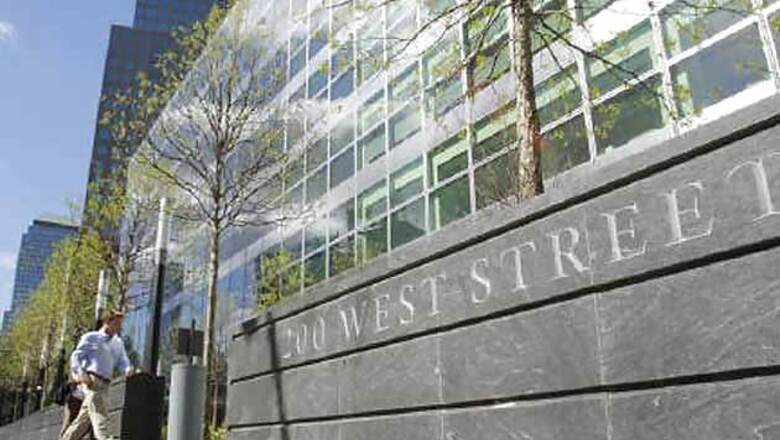
views
Washington/New York: Goldman Sachs Group Inc agreed to pay $ 550 million to settle civil fraud charges over how it marketed a subprime mortgage product, ending months of negotiations that rattled the bank's clients and investors.
The US Securities and Exchange Commission said the penalty was the largest ever for a financial institution, and leaves the door open for future civil suits.
But many investors viewed the $ 550 million settlement as a slap on the wrist for a bank that earned more than $ 13 billion last year.
"They pay $ 550 million and they get an $ 800 million pop in their stock price ... they got off easy," said Kevin Caron, a market strategist at Stifel, Nicolaus & Co in Florham Park, New Jersey.
The company's shares later rose further, bringing the total gain in Goldman's market value on Thursday to about $ 6.6 billion. In the months after the SEC pressed charges on April 16, Goldman's market value fell by more than $ 25 billion.
Goldman, which regretted failing to disclose information in marketing materials, agreed to require two internal committees to vet complex deals linked to residential mortgages.
It also agreed to run by its legal or compliance department all marketing materials used in connection with mortgage securities offerings.
And even if the monetary impact is relatively slight, it has been a black eye for a bank that takes pride in its reputation. In some quarters, Goldman has come to epitomize the sins of Wall Street in general, with a Rolling Stone article last year famously calling it a "great vampire squid wrapped around the face of humanity."
The lawsuit forced Goldman executives to go into overdrive meeting with clients to reassure them about the overall health of the firm.
Major clients have generally stuck with Goldman, although some customers with large public profiles have been more cautious in working with the firm recently.
And some investors and former employees have speculated that Goldman Chief Executive Lloyd Blankfein's days at the helm could be numbered.
The settlement came just days before Goldman had been due to issue an answer to the SEC charges and post quarterly results.
A Goldman Sachs employee stepping outside of the firm's downtown Manhattan headquarters for a cigarette Thursday afternoon said he was "pleasantly surprised that it didn't drag on longer," and added that people inside the firm were relieved the suit was over.
Door still open for litigation
The settlement only resolves the issue of this transaction in particular, and Goldman did not admit or deny charges.
It leaves the door open for additional enforcement actions in other matters by the SEC and further investigation by federal prosecutors. The Department of Justice could still pursue criminal charges, although that now looks unlikely.
The SEC said it planned to continue its lawsuit against Fabrice Tourre, the vice president at Goldman accused of putting the deal in question together.
After settling with the SEC, Goldman must now fend of lawsuits from shareholders and other interested parties. Earlier this month, the bank asked a judge to combine 18 shareholder lawsuits in the wake of the SEC's charges.
The SEC accused Goldman of creating and marketing a debt product linked to subprime mortgage bonds without telling investors that hedge fund Paulson & Co helped choose the underlying securities and was betting against them.
The transaction in question, known as ABACUS 2007-AC1, yielded about $ 1 billion of profit for Paulson, which was not accused of wrongdoing. But investors on the other side of the deal -- including Germany bank IKB and Royal Bank of Scotland -- lost about $ 150 million and $ 840 million, respectively.
Goldman acknowledged in the settlement that its marketing materials were incomplete, which lawyers said was unusual.
Annemarie McAvoy, a Fordham University School of Law professor and a former federal prosecutor, said Goldman's acknowledgement could expose it to lawsuits.
"There was some language in there that certainly can be used against them," McAvoy said. "If there are other suits that will be brought, that certainly will be mentioned."
Of the $ 550 million settlement, $ 150 million will go to Germany's IKB, $ 100 million to the Royal Bank of Scotland and $ 300 million will go to the US Treasury. The settlement is subject to approval by a federal judge, which independent legal experts said was likely.
"I think it will be approved, given that two of the five SEC commissioners didn't think the case should have been brought at all," said Jonathan Macey, a securities and corporate law professor at Yale University Law School.
If the judge approves the settlement, it will represent a victory for SEC enforcement director Robert Khuzami and his staff. The former federal prosecutor was hand picked by SEC Chairman Mary Schapiro to help restore the agency's reputation after the regulator was humiliated for failing to stop Bernard Madoff's $ 65 billion fraud.
Khuzami shook up the enforcement division by creating specialized units to ferret out fraud, including a small squad to scour through structured products like the one in the Goldman case.
Initially shocked
The fact that the commission was split was evidence to many on Wall Street and even at the SEC itself that the government had a weak case. The commission was also split on the settlement, with the Republican commissioners dissenting.
The SEC announced the settlement on the same day a sweeping Wall Street regulatory reform package -- support for which was boosted in some quarters by the accusations against Goldman -- cleared Congress and headed to President Barack Obama for his signature.
Goldman Sachs' management -- initially shocked by the suit despite early warnings from the SEC -- was defiant and refused to negotiate. But about a month after the charges were filed in April, top Goldman officials, including Chief Financial Officer David Viniar, started talking to the SEC.
"At some point they shifted their attitude," said one source familiar with the negotiations.
The lawsuit hinged on the narrow issue of whether Goldman failed to disclose relevant information to a client. Many competitors on Wall Street viewed the case as unreasonable, given that the parties allegedly defrauded were supposed to be sophisticated investors that can evaluate securities for themselves. But others said that Goldman failed to disclose key information that investors would want to know.
So far, the financial crisis has not yielded any criminal prosecutions, either criminal or civil, which has frustrated some observers.
But civil or criminal fraud charges are hard to win when transactions are complicated, lawyers said.
"Every time there's a bubble burst or a majority of traders make an ill-advised decision doesn't always mean fraud was at the root of the problem," said Glen Donath, a former federal prosecutor now a partner at Katten Muchin Rosenman LLP in Washington.




















Comments
0 comment